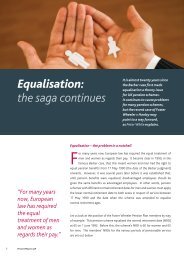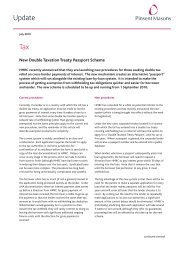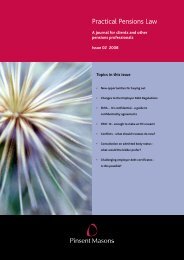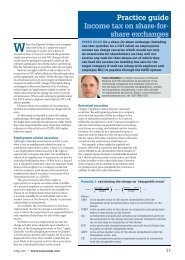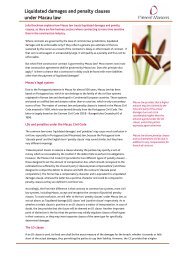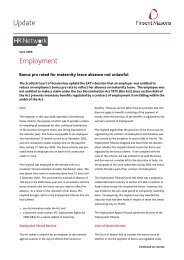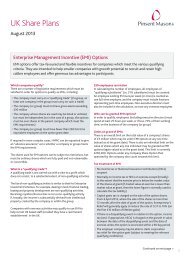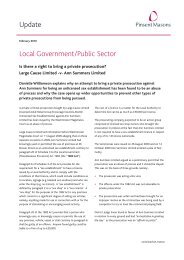Summary of recent employment law cases - Pinsent Masons
Summary of recent employment law cases - Pinsent Masons
Summary of recent employment law cases - Pinsent Masons
You also want an ePaper? Increase the reach of your titles
YUMPU automatically turns print PDFs into web optimized ePapers that Google loves.
Update<br />
October 2009<br />
Share Plans<br />
A summary <strong>of</strong> <strong>recent</strong> <strong>employment</strong> <strong>law</strong> <strong>cases</strong><br />
The following <strong>cases</strong> have considered points <strong>of</strong> <strong>employment</strong> <strong>law</strong>, but raise issues which are<br />
<strong>of</strong> interest in relation to share incentive arrangements.<br />
Exercise <strong>of</strong> option shortly before termination<br />
<strong>of</strong> <strong>employment</strong><br />
<br />
The decision<br />
Mr Plumbly was the first employee <strong>of</strong> the company which<br />
became Beatthatquote.com. He was granted an option to<br />
subscribe at minimal cost for shares in the company. As the<br />
relationship between him and the company's founder and<br />
controlling shareholder had deteriorated, he gave notice to<br />
exercise his option at the earliest opportunity - on the first<br />
anniversary <strong>of</strong> the date <strong>of</strong> grant. Shortly afterwards, he<br />
resigned from the company.<br />
The company did not allot the option shares to Mr Plumbly<br />
on the basis that due to his misconduct, he was not entitled<br />
to exercise the option. In this approach, they seem to have<br />
relied on the decision in Tesco v Pook [2004] where it was<br />
held that an option could not be exercised by an employee<br />
who was in breach <strong>of</strong> his fiduciary duties to the company,<br />
and who was guilty <strong>of</strong> a repudiatory breach <strong>of</strong> his own<br />
<strong>employment</strong> contract.<br />
The High Court found in favour <strong>of</strong> Mr Plumbly – as a<br />
question <strong>of</strong> fact, he did not owe the company any fiduciary<br />
duty, and was not guilty <strong>of</strong> misconduct as alleged. The<br />
company should therefore have honoured his option<br />
exercise. Instead <strong>of</strong> requiring the company to issue the<br />
option shares however, the Court award damages in favour<br />
<strong>of</strong> Mr Plumbly.<br />
<br />
Point to note<br />
Behaviour during employee's notice period<br />
<br />
The decision<br />
Mr Cook resigned from his position with MHSK Ltd on a 6<br />
month notice period. During that period a dispute arose<br />
between the company and Mr Cook, following which Mr<br />
Cook went <strong>of</strong>f sick with stress. He was later allowed back to<br />
work. Subsequent disciplinary proceedings resulted in his<br />
being summarily dismissed.<br />
In an appeal relating to the <strong>law</strong>fulness <strong>of</strong> his dismissal, the<br />
High Court found that MHSK Ltd had effectively affirmed Mr<br />
Cook's <strong>employment</strong> contract in the way they had treated<br />
him with sympathy and concern in relation to his sickness.<br />
The Court <strong>of</strong> Appeal upheld this position. MHSK Ltd could<br />
only allege breach in circumstances where it had reserved its<br />
position in relation to bringing disciplinary proceedings.<br />
<br />
Point to note<br />
This case does not relate directly to share incentives, but the<br />
impact <strong>of</strong> the decision may be relevant. Where an<br />
employee's entitlement to awards is determined at the date<br />
<strong>of</strong> actual termination (rather than at the date where notice<br />
<strong>of</strong> termination is given), conduct during the notice period<br />
may be relevant. An employee who resigns may have a<br />
greater entitlement under the rules <strong>of</strong> a share plan than one<br />
who is dismissed.<br />
Cook v MSHK Limited and Ministry <strong>of</strong> Sound Recordings Ltd<br />
[2009] EWCA Civ 624<br />
It is interesting to note that the Court awarded damages<br />
rather than requiring the company to issue the option<br />
shares. This is potentially more costly for a company.<br />
However, any potential issues arising from a minority<br />
shareholding by a disgruntled employee are avoided.<br />
Plumbly v Beatthatquote.Com Ltd. [2009] EWHC 321 (QB).<br />
Continued on reverse
Effect <strong>of</strong> entire agreement clause<br />
in compromise agreement<br />
<br />
The decision<br />
This case considered the interaction between restrictive<br />
covenants contained in a share purchase agreement, and<br />
employee's service agreement and his compromise<br />
agreement. The Court <strong>of</strong> Agreement held that the restrictive<br />
covenants in the compromise agreement did not replace<br />
those in the share purchase agreement, despite the inclusion<br />
<strong>of</strong> an "entire agreement" clause in the compromise<br />
agreement.<br />
<br />
Points to note<br />
The case was again not directly concerned with share<br />
incentives. However, it serves as a reminder that a<br />
compromise agreement should consider all elements <strong>of</strong> the<br />
relationship between employer and employee. Entitlements<br />
under share plans must therefore be reviewed in reaching<br />
compromise arrangements.<br />
In addition, if restrictive covenants form part <strong>of</strong> share<br />
incentive arrangements, these will sit alongside any other<br />
such covenants in, for example, <strong>employment</strong> contracts, and<br />
therefore consistency between the various arrangements will<br />
be important.<br />
Personnel Hygiene Services Ltd v Mitchell [2009]<br />
EWCA Civ 1047<br />
Who to Contact<br />
Judith Greaves<br />
Tel: 0113 294 5232<br />
Email: judith.greaves@pinsentmasons.com<br />
Rory Cray<br />
Tel: 0113 294 5179<br />
Email: rory.cray@pinsentmasons.com<br />
Lynette Jacobs<br />
Tel: 0161 250 0198<br />
Email: lynette.jacobs@pinsentmasons.com<br />
© <strong>Pinsent</strong> <strong>Masons</strong> LLP 2009<br />
This note does not constitute legal advice. Specific legal advice should be taken before acting on any <strong>of</strong> the topics covered.<br />
LONDON DUBAI BEIJING SHANGHAI HONG KONG SINGAPORE<br />
OTHER UK LOCATIONS: BIRMINGHAM BRISTOL EDINBURGH GLASGOW LEEDS MANCHESTER<br />
T 0845 300 32 32<br />
<strong>Pinsent</strong> <strong>Masons</strong> LLP is a limited liability partnership registered in England & Wales (registered number: OC333653) and regulated by the Solicitors Regulation Authority. The word 'partner', used in relation to<br />
the LLP, refers to a member <strong>of</strong> the LLP or an employee or consultant <strong>of</strong> the LLP or any affiliated firm who is a <strong>law</strong>yer with equivalent standing and qualifications. Singapore location in association with MPillay.<br />
A list <strong>of</strong> members <strong>of</strong> the LLP, and <strong>of</strong> those non-members who are designated as partners, is displayed at the LLP's registered <strong>of</strong>fice: CityPoint, One Ropemaker Street, London, EC2Y 9AH, United Kingdom. We<br />
use ‘<strong>Pinsent</strong> <strong>Masons</strong>’ to refer to <strong>Pinsent</strong> <strong>Masons</strong> LLP and affiliated entities that practise under the name ‘<strong>Pinsent</strong> <strong>Masons</strong>’ or a name that incorporates those words. Reference to ‘<strong>Pinsent</strong> <strong>Masons</strong>’ is to <strong>Pinsent</strong><br />
<strong>Masons</strong> LLP and/or one or more <strong>of</strong> those affiliated entities as the context requires. For important regulatory information please visit: www.pinsentmasons.com<br />
www.pinsentmasons.com





